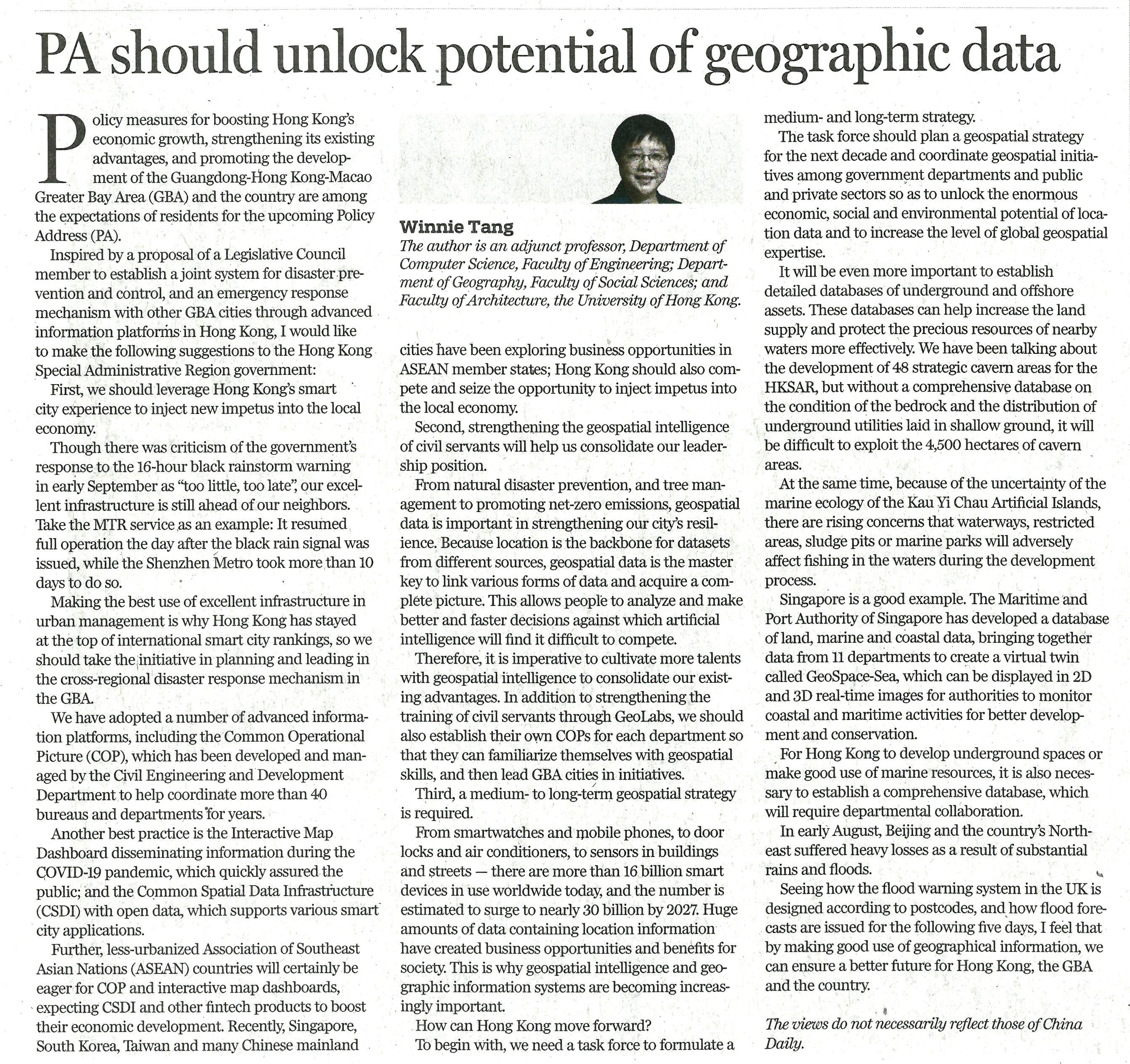網上版請按此

PA should unlock potential of geographic data
Policy measures for boosting Hong Kong's economic growth, strengthening its existing advantages, and promoting the development of the Guangdong-Hong Kong-Macao Greater Bay Area (GBA) and the country are among the expectations of residents for the upcoming Policy Address (PA).
Inspired by a proposal of a Legislative Council member to establish a joint system for disaster prevention and control, and an emergency response mechanism with other GBA cities through advanced information platforms in Hong Kong, I would like to make the following suggestions to the Hong Kong Special Administrative Region government:
First, we should leverage Hong Kong's smart city experience to inject new impetus into the local economy.
Though there was criticism of the government's response to the 16-hour black rainstorm warning in early September as "too little, too late", our excellent infrastructure is still ahead of our neighbors. Take the MTR service as an example: It resumed full operation the day after the black rain signal was issued, while the Shenzhen Metro took more than 10 days to do so.
Making the best use of excellent infrastructure in urban management is why Hong Kong has stayed at the top of international smart city rankings, so we should take the initiative in planning and leading in the cross-regional disaster response mechanism in the GBA.
We have adopted a number of advanced information platforms, including the Common Operational Picture (COP), which has been developed and managed by the Civil Engineering and Development Department to help coordinate more than 40 bureaus and departments for years.
Another best practice is the Interactive Map Dashboard disseminating information during the COVID-19 pandemic, which quickly assured the public; and the Common Spatial Data Infrastructure (CSDI) with open data, which supports various smart city applications.
Further, less-urbanized Association of Southeast Asian Nations (ASEAN) countries will certainly be eager for COP and interactive map dashboards, expecting CSDI and other fintech products to boost their economic development. Recently, Singapore, South Korea, Taiwan and many Chinese mainland cities have been exploring business opportunities in ASEAN member states; Hong Kong should also compete and seize the opportunity to inject impetus into the local economy.
Second, strengthening the geospatial intelligence of civil servants will help us consolidate our leadership position.
From natural disaster prevention, and tree management to promoting net-zero emissions, geospatial data is important in strengthening our city's resilience. Because location is the backbone for datasets from different sources, geospatial data is the master key to link various forms of data and acquire a complete picture. This allows people to analyze and make better and faster decisions against which artificial intelligence will find it difficult to compete.
Therefore, it is imperative to cultivate more talents with geospatial intelligence to consolidate our existing advantages. In addition to strengthening the training of civil servants through GeoLabs, we should also establish their own COPs for each department so that they can familiarize themselves with geospatial skills, and then lead GBA cities in initiatives.
Third, a medium- to long-term geospatial strategy is required.
From smartwatches and mobile phones, to door locks and air conditioners, to sensors in buildings and streets — there are more than 16 billion smart devices in use worldwide today, and the number is estimated to surge to nearly 30 billion by 2027. Huge amounts of data containing location information have created business opportunities and benefits for society. This is why geospatial intelligence and geographic information systems are becoming increasingly important.
How can Hong Kong move forward?
To begin with, we need a task force to formulate a medium- and long-term strategy.
The task force should plan a geospatial strategy for the next decade and coordinate geospatial initiatives among government departments and public and private sectors so as to unlock the enormous economic, social and environmental potential of location data and to increase the level of global geospatial expertise.
It will be even more important to establish detailed databases of underground and offshore assets. These databases can help increase the land supply and protect the precious resources of nearby waters more effectively. We have been talking about the development of 48 strategic cavern areas for the HKSAR, but without a comprehensive database on the condition of the bedrock and the distribution of underground utilities laid in shallow ground, it will be difficult to exploit the 4,500 hectares of cavern areas.
At the same time, because of the uncertainty of the marine ecology of the Kau Yi Chau Artificial Islands, there are rising concerns that waterways, restricted areas, sludge pits or marine parks will adversely affect fishing in the waters during the development process.
Singapore is a good example. The Maritime and Port Authority of Singapore has developed a database of land, marine and coastal data, bringing together data from 11 departments to create a virtual twin called Geo-Space-Sea, which can be displayed in 2D and 3D real-time images for authorities to monitor coastal and maritime activities for better development and conservation.
For Hong Kong to develop underground spaces or make good use of marine resources, it is also necessary to establish a comprehensive database, which will require departmental collaboration.
In early August, Beijing and the country's Northeast suffered heavy losses as a result of substantial rains and floods.
Seeing how the flood warning system in the UK is designed according to postcodes, and how flood forecasts are issued for the following five days, I feel that by making good use of geographical information, we can ensure a better future for Hong Kong, the GBA and the country.
Dr. Winnie Tang
Adjunct Professor, Department of Computer Science, Faculty of Engineering; Department of Geography, Faculty of Social Sciences; and Faculty of Architecture, The University of Hong Kong